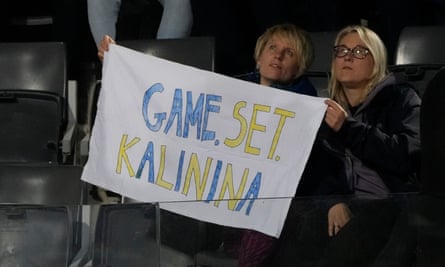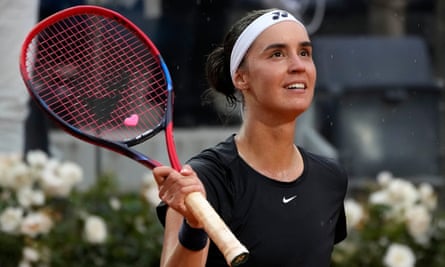Anhelina Kalinina, the highest ranked Ukrainian tennis player, has warm memories of the formative years she spent growing up in Nova Kakhovka. It is the place where her family, which contains many tennis coaches, first placed a tennis racket in her hands. As Kalinina took to the sport, she grew up surrounded by a strong, competitive community of players whose intense competition helped to mould her into the player she is today.
They are memories from a different world. In February 2022, Nova Kakhovka, a city situated in the southern Kherson oblast, was occupied by Russia. Then, last month, Russia’s destruction of its dam has led to an environmental disaster within the area with thousands displaced. Even as the disasters piled up at their doorstep, Kalinina’s grandparents refused to leave their hometown until one day it became a choice between life and potential death.
“Because of the situation with the war, my grandma and grandfather were running away from Nova Kakhovka because that territory is occupied,” says Kalinina. “No courts, it’s impossible to live there. So many military. Explosions every day. My granny, who lived there, was not leaving her home until the last moment when a bomb [struck] the house next door. Because of that, she decided it was time to move. Now everyone is in Kyiv.”
Despite spending the last 17 months perpetually on high alert, shouldering the pain of seeing her country invaded by Russia, this has simultaneously been the most fruitful period of Kalinina’s professional tennis career as she has broken new ground and established herself at the highest level. Last month, the 26-year-old reached the final of the Italian Open, a WTA 1000 tournament, reaching a career high of No 25.
Kalinina’s path towards this altitude is a reflection of the supreme resilience required to overcome her various challenges and keep on moving forward. Even as it became clear that she had significant potential, Kalinina’s parents, both tennis coaches, could not afford the prohibitive expenses that come with being a professional tennis player. Her trajectory changed when she and her family were invited to Kyiv to meet a businessman.
“They invited me to see me in Kyiv. Then he made a decision: ‘Yeah, this girl was good, I want to help her.’ And now he’s like my second dad,” she says.
The businessman, whose name Kalinina decided not to reveal, funded Kalinina’s career from the age of 10 years old for a decade. It allowed her to move permanently to Kyiv and she began to travel to tournaments around the world after spending her youth competing only within Ukraine’s borders.
The journey since has, at times, been brutal. Kalinina enjoyed a great junior career, reaching the top 10, and her transition to the professional tours was initially seamless. By 18 years old, she was already a top 150 player and among the best of an age group that included Naomi Osaka and Belinda Bencic.

Photograph: Gregorio Borgia/AP
But then she became stuck. Throughout the following years, Kalinina struggled to take the next step in her career. The top 100 became an invisible barrier. “You’re battling at tournaments on courts where you know no one is watching. No live stream. Sometimes no referees and so on. You’re hungry, you see the goal. You see how it can be a different way. You want to change this. So you’re always motivated,” she says.
Kalinina’s problems were varied. First, she simply could not stay healthy, with countless injury setbacks that included a major shoulder injury. On the court, Kalinina was also inconsistent and she struggled mentally. Money soon became a stressor as she spent her time just trying to make enough to reach her next event.
“There was absolutely no money, no prize money, nothing,” she says. “When you’re winning $25k or $60k [tournaments], you get money but then you take this money, and you put it into the next week of travel, and into the next week. So when I was not winning, I was at zero. When I was winning, it was plus $1,000 or, I don’t know, $245 depending on the level of the ITF tournament. But it was always hard to see [the money]. I was just making this investment of $1,000 into myself for the next tournament.”
Four times a year, the grand slam qualifying events, with their pristine courts and venues – aside from Wimbledon – would serve as a reminder of what Kalinina was fighting for. She would frequently miss out on making it to the main draw and she would head back to the lower level events still digesting the pain of her defeats.
“I really wanted to change the situation and for years it was not working. But you never just give up because at some point sometimes one year, two, three, but nothing changes. You kind of stuck there. And you think: ‘What am I doing wrong? Because I’m working, I’m always there, but I’m not on the WTA. I’m not playing at this level.’”
She continues: “But then it clicks one day. [You need] your game, the results, all your effort and a little bit of luck – [luck] always gives you this push. [When you succeed] you’re like: ‘Yeah, I was doing everything right. And now it works.’ It gave me a lot of experience as well. I was unbreakable mentally because of all these difficulties.”

After seven years of toiling, when she did find her feet, Kalinina’s rise was unbelievably swift. Between April and July 2021, she suddenly caught fire. She won 28 of her 30 matches, including four ITF titles and a run to the final of a WTA event in Budapest, and she upset the former No 1 Angelique Kerber at the French Open that year. After years of falling short, she was suddenly a top 100 player.
“It was five years of: ‘What’s wrong? What’s wrong? What’s wrong?’ but when I made it, I was like: ‘Yeah, nothing was wrong. It was just not my time. That’s all.’ And it happened when it happened. Better late than never,” she says, laughing.
Since breaking into the top 100 and erasing that mental barrier, Kalinina’s momentum has only carried her forward. At the same time, this period has spotlighted the strength of tennis in Ukraine, with the success of the the country’s female players meaning that they have been able to advocate for themselves vocally. While the highest ranked Ukrainian male player, Oleksii Krutykh, is ranked No 181, there are currently five Ukrainian women inside the top 100. Last month, for the first time two Ukrainian women – Elina Svitolina and Lesia Tsurenko – reached the fourth round of the French Open.
While this generation has continued to thrive even as their country is under attack, the impact of Russia’s invasion of Ukraine on future generations will be catastrophic. Tennis clubs have been struck by missiles, children are traumatised by exploding missiles and in Nova Kakhovka many venues are underwater from flooding. For Kalinina, given her parents’ occupation, the future of Ukrainian tennis is a particularly painful subject. As she discusses it, Kalinina explains that her mother has a group of children under 10.
“They were having breakfast a couple of months ago and there was thunder. The kids were so afraid that they couldn’t practise anymore, because the sound was so similar to the rocket bomb explosion. They stopped. They couldn’t practise. Can you imagine the kids living in that environment? When they’re going to school and then the siren goes [so] they go to the bomb shelter because of the explosions. How can they play tennis like this? How can they live like this?”




